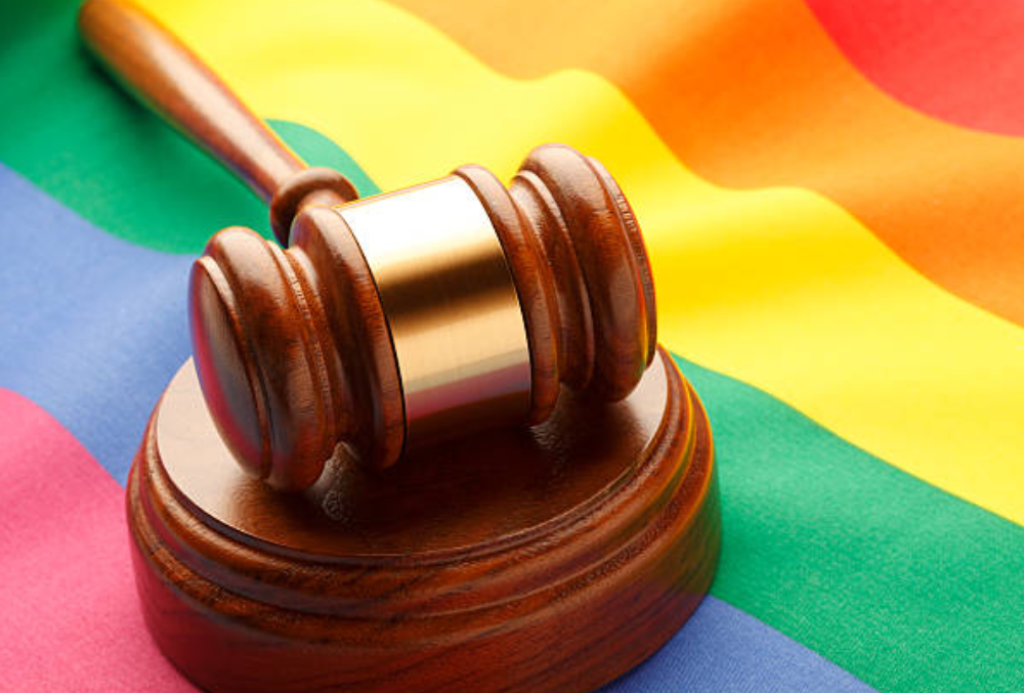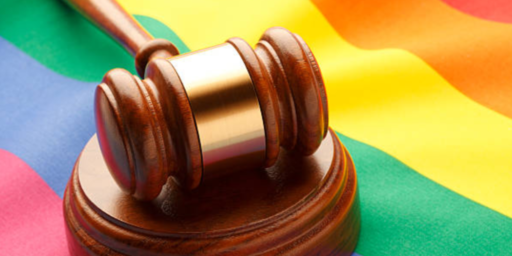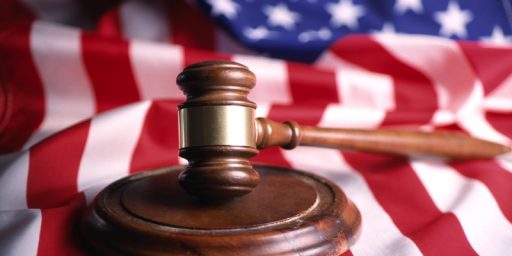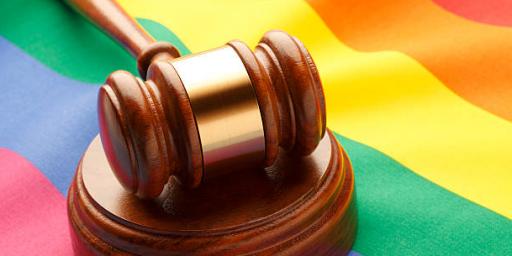SCOTUS To Decide If Civil Rights Laws Bar Discrimination Against LGBT Employees
The Supreme Court has agreed to accept a group of cases dealing with the issue of whether or not existing civil rights laws bar discrimination based on sexual orientation and gender identity.

The Supreme Court announced today that the Justices had agreed to take on an appeal dealing with an issue that has been bouncing around the Circuit Courts of Appeal for several years now, specifically the question of whether or not existing civil rights laws bar discrimination against LGBT employees of private companies:
WASHINGTON — The Supreme Court announced on Monday that it would decide whether a federal law prohibits employers from discriminating against gay and transgender workers.
The law, Title VII of the Civil Rights Act of 1964, forbids employment discrimination based on sex. The question for the justices is whether that language bars discrimination based on sexual orientation or transgender status.
Most federal appeals courts have interpreted the law to exclude sexual orientation discrimination. But two of them, in New York and Chicago, recently issued decisions ruling that discrimination against gay men and lesbians is a form of sex discrimination.
The Supreme Court agreed to hear the case from New York, Altitude Express Inc. v. Zarda, No. 17-1623, along with one from Georgia that came to the opposite conclusion, Bostock v. Clayton County, Georgia, No. 17-1618.
The New York case was brought by a sky-diving instructor who said he was fired because he was gay. The United States Court of Appeals for the Second Circuit concluded that ”sexual orientation discrimination is motivated, at least in part, by sex and is thus a subset of sex discrimination.”
The Georgia case was brought by a child welfare services coordinator who said he was fired for being gay. The 11th Circuit, in Atlanta, ruled against him in a short, unsigned opinion that cited a 1979 decision that had ruled that “discharge for homosexuality is not prohibited by Title VII.”
The justices also agreed to decide the separate question of whether Title VII bars discrimination against transgender people. The case, R.G. & G.R. Harris Funeral Homes v. Equal Employment Opportunity Commission, No. 18-107, concerns Aimee Stephens, who was fired from a Michigan funeral home after she announced that she was a transgender woman and would start working in women’s clothing.
She sued and won in the United States Court of Appeals for the Sixth Circuit, in Cincinnati. Discrimination against transgender people, the court ruled, was barred by Title VII.
“It is analytically impossible to fire an employee based on that employee’s status as a transgender person without being motivated, at least in part, by the employee’s sex,” the court said, adding, “Discrimination ‘because of sex’ inherently includes discrimination against employees because of a change in their sex.”
Amy Howe at SCOTUSBlog has more:
The Supreme Court announced today that it will weigh in next term on whether federal employment discrimination laws protect LGBT employees. After considering a trio of cases — two claiming discrimination based on sexual orientation and the third claiming discrimination based on transgender status — at 11 consecutive conferences, the justices agreed to review them. Until today, the cases slated for oral argument next term had been relatively low-profile, but this morning’s announcement means that the justices will have what will almost certainly be blockbuster cases on their docket next fall, with rulings to follow during the 2020 presidential campaign.
In Altitude Express v. Zarda, the justices will decide whether federal laws banning employment discrimination protect gay and lesbian employees. The petition for review was filed by a New York skydiving company, now known as Altitude Express. After the company fired Donald Zarda, who worked as an instructor for the company, Zarda went to federal court, where he contended that he was terminated because he was gay – a violation of (among other things) Title VII of the Civil Rights Act of 1964, which bars discrimination “because of sex.”
The trial court threw out Zarda’s Title VII claim, reasoning that Title VII does not allow claims alleging discrimination based on sexual orientation. But the full U.S. Court of Appeals for the 2nd Circuit reversed that holding, concluding that Title VII does apply to discrimination based on sexual orientation because such discrimination “is a subset of sex discrimination.”
Altitude Express took its case to the Supreme Court last year, asking the justices to weigh in. In 2017, the justices had denied review of a similar case, filed by a woman who alleged that she had been harassed and passed over for a promotion at her job as a hospital security officer in Georgia because she was a lesbian. However, that case came to the court in a somewhat unusual posture: Neither the hospital nor the individual employees named in the lawsuit had participated in the proceedings in the lower courts, and they had told the Supreme Court that they would continue to stay out of the case even if review were granted, which may have made the justices wary about reviewing the case on the merits.
Altitude Express’ case will be consolidated for one hour of oral argument with the second case involving the rights of gay and lesbian employees: Bostock v. Clayton County, Georgia. The petitioner in the case, Gerald Bostock, worked as a child-welfare-services coordinator in Clayton County, Georgia. Bostock argued that after the county learned that he was gay, it falsely accused him of mismanaging public money so that it could fire him – when it was in fact firing him because he was gay.
Bostock went to federal court, arguing that his firing violated Title VII. The county urged the court to dismiss the case, arguing that Title VII does not apply to discrimination based on sexual orientation. The district court agreed, and the U.S. Court of Appeals for the 11th Circuit upheld that ruling.
In the third case granted today, R.G. & G.R. Harris Funeral Homes v. EEOC, the justices will consider whether Title VII’s protections apply to transgender employees. The petition for review was filed by a small funeral home in Michigan, owned by Thomas Rost, who describes himself as a devout Christian. In 2007, the funeral home hired Aimee Stephens, whose employment records identified Stephens as a man. Six years later, Stephens told Rost that Stephens identified as a woman and wanted to wear women’s clothing to work. Rost fired Stephens, because Rost believed both that allowing Stephens to wear women’s clothes would violate the funeral home’s dress code and that he would be “violating God’s commands” by allowing Stephens to dress in women’s clothing.
The federal Equal Employment Opportunity Commission filed a lawsuit on Stephens’ behalf, and the U.S. Court of Appeals for the 6th Circuit ruled for the EEOC and Stephens. The funeral home went to the Supreme Court last summer, asking it to review the lower court’s ruling. Today the justices granted the funeral home’s petition for review, agreeing to consider whether Title VII bars discrimination against transgender people based on either their status as transgender or sex stereotyping under the Supreme Court’s 1989 decision in Price Waterhouse v. Hopkins, which indicates that a company can’t discriminate based on stereotypes of how a man or woman should appear or behave. The funeral home’s case will be argued separately from Bostock and Altitude Express.
The issue of whether or not Title VII’s protections extend to LGBT Americans has been the subject of several conflicting court rulings in recent years. Most recently, the Second Circuit Court of Appeals ruled that those protections did apply to discrimination based on sexual orientation, a ruling that overruled a prior ruling by a three-judge panel of the same court. Last year, a three-judge panel on the 11th Circuit Court of Appeals held that Title VII did not apply to discrimination based on sexual orientation. To a large degree, the court in that particular case based its ruling on the fact that there was no evidence in the record that banning discrimination based on sexual orientation was within the contemplation of Congress when the Civil Rights Act was passed in 1964. One month after that ruling, though, the Seventh Circuit Court of Appeals ruled in an en banc opinion that discrimination based on sexual orientation was “a form of sex discrimination” and therefore covered by the protections of Title VII. In December, the Supreme Court declined to hear an appeal in the 11th Circuit case. To date, none of the other cases have made their way to the nation’s highest court.,
While the cases involving student access to the bathroom that confirms to their gender identity raise, in addition to the claims under Title VII and Title IX, claims under the 14th Amendment’s Equal Protection Clause, these employment law cases are largely based on statutory interpretation. Specifically, the question that courts have wrestled with is whether or not the bar against discrimination in employment based on “sex” includes discrimination against a transgender employee who, for example, may have been born biologically male but identifies, dresses, and lives their life based on their gender identity as a woman and whether that bar also applies to someone who is either male or female but attracted to members of their own gender.
In those cases, perhaps the most important case is the Supreme Court’s ruling in a 1989 case called Price Waterhouse v. Hopkins. In that case, the Supreme Court found in favor of a female Plaintiff who had maintained that she had been denied partnership in the firm that employed her because she did not into the idea of what a female employee should look and act like. The ruling was significant for the purpose of anti-discrimination law because the Court ruled that sex discrimination under the Civil Rights Act included gender stereotyping and the action of discriminating against someone because they didn’t fit into some preconceived notion of what a person of a certain biological gender should be like was barred by Federal law. In this case, that would mean that a biological male who chooses to identify as a female could not be discriminated against in employment and advocates for extending the law to include gays and lesbians have argued that it should apply to those whose sexual orientation differs from what is considered “correct” based on their gender.
In the past, I have said that I was skeptical of the argument that Title VII’s ban on discrimination based on “sex” applied to claims based on either sexual orientation or gender identity because it seems clear from the legislative history that the drafters of the law did not even consider whether the law they were writing would apply to such claims. Based on the overwhelming weight of the court rulings on the discrimination issue, though, and upon further reflection, I’ve come to the conclusion that my previous position on this issue was faulty and that the Price Waterhouse precedent would clearly seem to apply to at least some of the issues raised by these cases.
The argument seems to me to be strongest in the case of discrimination based on gender identity. Unless the Court is prepared to severely limit the holding in that case, it seems to me that, at least in the context of employment law, discrimination against transgender Americans based on the fact that their behavior, style of dress, or personal relationships do not fit within pre-existing notions of what “proper” for a biological male or female would seem to be clear examples of impermissible discrimination under the Civil Rights Act of 1964 and related law as interpreted in Price-Waterhouse.
When it comes to discrimination based on sexual orientation, the case seems to be somewhat weaker since the issues related to sexual orientation are different from those related to gender identity. In addition to the legislative intent issues raised above, which clearly indicate that the drafters of the Civil Rights Act of 1964 did not consider the possibility that discrimination on the basis of “sex” would include sexual orientation.
In any case, these cases will likely be among the most prominent cases that the Court will hear in the term set to begin in October of this year, but it’s likely it will be well into 2020 before we see rulings from the Court on what will clearly be a hotly contested issue.




I think we’re going to miss Justice Kennedy on this one.
I expect the Court to rule 5-4 that the law does not forbid LGTB discrimination. And with the possible exception of gender identity, I’m forced to agree. The law wasn’t intended to be stretched in this way. If Congress wants to ban LGBT discrimination, they can amend the law. It shouldn’t be up for the Courts to rewrite the law for them.
I don’t believe Roberts will end up allowing pure discrimination against LGBT people. But I can believe he will entertain a crazy ‘compromise’ where fringe groups get a nebulous right-to-discriminate against people they don’t like, as long as these people are gay or trans.
@Hal_10000:
As I said above I think you can make a strong case that the CRA’s ban on discrimination based on “sex” does include gender identity. The argument seems harder to make, though when it comes to sexual orientation.
@Doug Mataconis: I agree with your interpretation of what’s most likely to go down. Which will mean that transsexuals (a much smaller population) will get more legal protection than gays and lesbians.
I expect squawks from both sides.
@Doug Mataconis:
Yes to your analysis, but I think Hal_10000 makes the correct point that many of these “close” calls for the courts would be better addressed by the legislature keeping up with changing social mores or changing technical circumstances or simply fixing poor drafting when it is brought to their attention rather than forcing courts to parse through unnecessarily complicated law suits.
@grumpy realist: not here to police your language, but you seem like the sort of person that might appreciate knowing that “transgender” is generally considered by this community as much preferred over “transsexual”
@Doug Mataconis:
While I am very glad you’ve come around on the impact of PWC and how it covers gender identity, I think you are making a distinction here to exclude sexual orientation that can’t survive logically.
The reason that some people want to discriminate against someone on the basis of sexual orientation is that the target’s preferred sexual partner’s gender don’t match what the discriminator’s believes should be the proper sexual partner for a person of the target’s gender/sex.
How is that distinguishable from PWC?
@Joe: Almost never going to happen. Legislation usually only gets passed after there’s a whole lot of lawsuits which get decided “the wrong way”, resulting in sufficient complaints to get the impetus up for the legislature to fix the problem. Sort of makes sense–because quite often it’s not until you see how a new technology works out in real life that you’re able to identify what issues its use brings up. Example: ownership of personal data that you voluntarily put up on places like Facebook and how much Big Data companies can use it.
If everybody simply minded his/her own f***n business, this wouldn’t be an issue. Alas …
Price Waterhouse Pretty clearly applies, so this should be easy unless they want to revisit that.
That said, I am half expecting a ruling that you cannot discriminate against straight cisgender people for being straight or cisgender.
@grumpy realist: I am not so naive as to think it’s likely to happen. I am simply complaining about legislatures in general (and since forever) dumping poorly drafted legislation or ignoring outdated legislation and forcing the courts to deal with choices that should be legislative (or in the case of administrative rules, executive) and then complaining about activist courts misinterpreting the statutes (or rules).
@Joe:
I agree. This is a matter for Congress, although it can also be addressed at the state level with the adoption of broader civil rights protections for gays and lesbians.
@Gustopher:
I think the argument that Price Waterhouse applies in the case of discrimination based on gender identity is stronger than the argument that it also applies in the case of discrimination based on sexual orientation.
@Doug Mataconis:
Could you expand on that? To me, it seems like discrimination on the basis of sexual orientation is a clear case of discrimination “based on stereotypes of how a man or woman should appear or behave”…
@dennis:
This.
When I was 21, I went to work at ABC Television in an entry level position where I shared a cubicle with another person, who we will call Terry. I was 21, Hispanic, raised Catholic, and very homophobic. Terry was 35, African American, 5-5, 185 lbs of solid muscle, and gayer than Elton John. What a shock to my system. My homophobia lasted all of two weeks, because Terry was funny as hell, smart, and a great teacher to this 21 year old newbie who had no idea what the hell he was doing in his first “real” job. At the time, Terry and his peeps, were fighting the good fight for equality under the law. I was happy to join that fight with them.
Cut to almost 20 years later. I met Larry and Andy Wachowski in 2000 right after “The Matrix” came out. I found them to be cool, funny, smart, intriguing people. I met them again two years ago, after “Sense8” dropped on Netflix, but now they’re Lana and Lily. You know what? They’re still cool, funny, smart and intriguing.
Long story for me to say that is someone’s gender really bothers you, that’s on you, not them. You need to get over it. These people are here to stay. And whether or not the law catches up to current societal standards, the culture will not slow down in terms of their acceptance.
@EddieInCA:
Holy shyt, I didn’t know that about the Wachowskis!
@dennis:
https://en.wikipedia.org/wiki/The_Wachowskis
BTW – “Sense8” on Netflix is an amazing series by the Wachowskis They did two seasons and a movie finale. In my opinion, it’s brilliant television. Anyone who doesn’t like orgies, same sex relationships, and great action will be disappointed. Just make sure you watch from the first minutes and pay attention, or else you’ll be lost.
Surely the Due Process Clause and the Equal Protection Clause of the Fourteenth Amendment to the United States Constitution weren’t written with the drafters considering the rights of gay people…and yet, both items were used to justify the overturning of gay marriage bans…
That’s pretty hard to do when you think you’re religion tells you to punish/persecute those who commit “abominations”…
I wonder how long it would have taken Congress to legalize gay marriage without Obergefell v. Hodges…indeed, I wonder how long it would have taken Congress to pass many laws which expanded rights to minority groups without the intervention of the Supreme Court…
@dennis: It’s reductionist thinking like yours that’s going to ruin the “right to hate people” philosophy that’s driving a lot of conservative thinking–especially among Evangelicals. Keep up the good work!